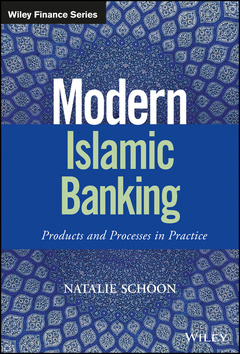Description
Modern Islamic Banking
Products and Processes in Practice
The Wiley Finance Series
Author: Schoon Natalie
Language: English
Keywords
Modern Islamic Banking: Products, Processes, in Practice, Natalie Schoon, Formabb, Islamic banking guide, Islamic banking fundamentals, understanding Islamic banking, Islamic banking vocabulary, Islamic banking products, Islamic banking primer, Islamic banking operations, Islamic banking procedures, Islamic banking paradigm, Islamic banking valuation, Islamic microfinance, Islamic banks, Islamic banking key concepts, Islamic banking applications, practical Islamic banking, Islamic banking in Western contexts, Islamic banking post financial crisis
Approximative price 73.73 €
In Print (Delivery period: 14 days).
Add to cart192 p. · 17.8x25.2 cm · Hardback
Description
/li>Contents
/li>Biography
/li>
Modern Islamic Bankingprovides a comprehensive, up-to-the-minute guide to the products, processes and legal doctrines underlying Islamic banking. Written by a pioneering practitioner in the field, this book provides thorough guidance and expert-level perspective on the principles and applications of this alternative-banking model. You'll begin by learning the fundamentals, vocabulary and key concepts of Islamic banking, then explore key products including istisna'a, murabaha, musharaka, ijara, sukuk, and salam. Coverage then moves into practical applications of Islamic products to a variety of contexts including asset management, treasury, risk management, venture capital, SME finance, micro-finance and taxation. Regulatory frameworks are discussed in detail, including extensive coverage of post-financial crisis Islamic bank valuation.
Islamic banking has experienced rapid growth over the past decade, a trend that is set to continue given the sector's successful weathering of the financial crisis. This book brings you up to speed on this alternative way of banking, and shows you how it applies within your own current practices.
- Understand the principles of Islamic banking and finance
- Learn the products, vocabulary and key concepts of the field
- Consider the applications in a variety of financial contexts
- Explore the regulatory frameworks and valuation of Islamic banks
Islamic banking practices differ from Western banking in fundamental ways ? it's these differences that shielded the sector during the global crisis, but they also require practitioners to understand a whole new set of rules, products and practices. Modern Islamic Banking gives you a solid understanding of the fundamentals and expert insight into modern practical applications.
List of Figures xi
List of Tables xiii
Acknowledgements xv
About the Author xvii
Introduction xix
CHAPTER 1 Historical Developments 1
1.1 The History of Finance 1
1.2 The History of Islamic Finance 5
CHAPTER 2 Economic Principles 7
2.1 Early Economic Thought 7
2.2 The Prohibition of Interest 9
2.3 Modern Economics and Banking 36
2.4 Islamic Ethics 38
2.5 Contracts and Prohibitions 40
2.6 Sharia’a and Prohibitions 43
CHAPTER 3 Islamic Finance Products Explained 51
3.1 Definitions 51
3.2 The Asset 52
3.3 Transaction Types 53
3.4 Bond-Like Instruments 63
CHAPTER 4 Distribution of Islamic Products 73
4.1 Distribution Channels and Sharia’a Compliance 73
4.2 Sharia’a Compliant versus Sharia’a Based 74
4.3 Competition or Opportunity 75
CHAPTER 5 Application of Islamic Products in Retail Finance 77
5.1 Current Accounts 77
5.2 Credit Cards 78
5.3 Deposit Accounts 79
5.4 Funds 83
5.5 Mortgage Products 84
5.6 Personal Loans 85
5.7 Transfers 87
CHAPTER 6 Application of Islamic Products in Treasury 89
6.1 Interbank Liquidity 89
6.2 Hedging 94
6.3 Combination of Transaction Types 98
6.4 Asset-Based Securities 99
6.5 Syndication 99
CHAPTER 7 Application of Islamic Products in Corporate Finance 101
7.1 Trade Finance 101
7.2 Project Finance 103
7.3 Property Finance 108
7.4 Leasing 113
CHAPTER 8 Application of Islamic Products to Private Equity 115
CHAPTER 9 The Role of the London Metal Exchange 117
9.1 The London Metal Exchange 117
9.2 Warrants 118
9.3 LME Base Metals 119
CHAPTER 10 Asset Management 121
10.1 Selection of Sharia’a compliant investments 122
10.2 Types of Funds 124
CHAPTER 11 Risks in Islamic Banks 125
CHAPTER 12 Governance 129
12.1 Roles 130
12.2 Social Responsibilities 132
12.3 Structures and Variations of Sharia’a Supervisory Boards 133
12.4 Serving on Multiple Boards 133
CHAPTER 13 The Islamic Financial Infrastructure 135
13.1 Regulatory Institutions 135
13.2 Socially Responsible Investments and Micro-finance 137
13.3 The Case for LIBOR 139
CHAPTER 14 Capital Adequacy Concerns 141
14.1 Challenges within the Basel Capital Adequacy Framework 141
14.2 IFSB Capital Adequacy Standards 142
14.3 Capital Adequacy for Islamic Banks around the World 148
14.4 Expected Future Developments in Capital Adequacy 149
CHAPTER 15 How to Value a Bank 151
15.1 The Components 152
15.2 The Models 153
15.3 The Special Case of Banks 154
15.4 The Special Case of Islamic Banks 154
15.5 Can a Bank be Valued? 155
CHAPTER 16 The Future 157
GLOSSARY 159
SELECT BIBLIOGRAPHY 161
INDEX 163
NATALIE SCHOON is a principal consultant with Formabb, which provides advisory services and training for financial institutions in Islamic finance, treasury, risk management and rules and regulations. She is on the board of advisors of Noriba Investing, which manages Halal investment portfolios for its clients, and is a visiting fellow at the ICMA Centre in Reading. She is also an accredited trainer for the Islamic Finance Qualification offered by the Chartered Institute of Securities and Investments.
These books may interest you

Islamic Finance For Dummies 22.38 €



